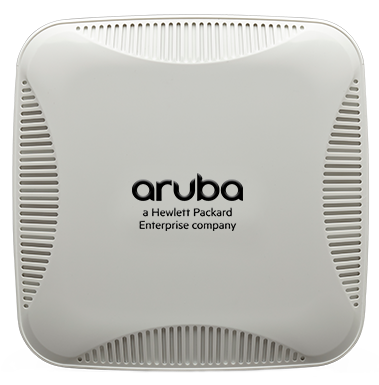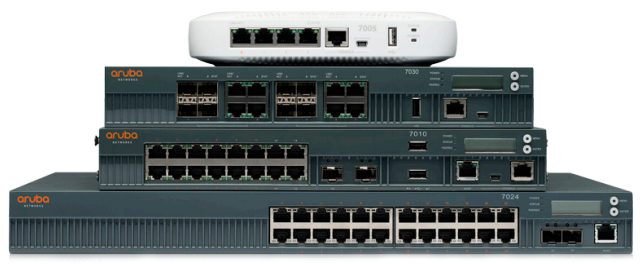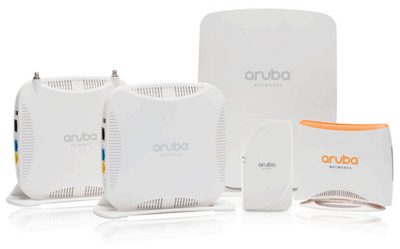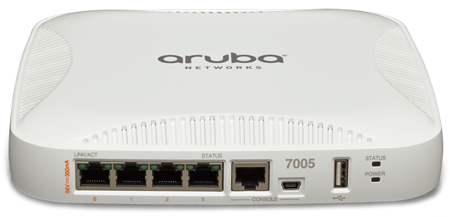
Aruba 7005 Mobility Controller
Extend the digital workplace to entry-level branch office

4x 10/100/1000BASE-T ports, Supports up to 16AP and 1K clients, powered by PoE-PD ethernet port (optional DC power accessory available)
Click here to jump to more pricing!
Please Note: All Prices are Inclusive of GST
 Overview:
Overview:
Aruba 7005 Mobility Controller is a compact, fanless entry-level branch platform that can be powered by a power-overEthernet (PoE) switch.
Aruba 7000 series Mobility Controllers optimize cloud services and secure enterprise applications for hybrid WAN at branch offices, while reducing the cost and complexity of deploying and managing the network.
The 7000 Series Mobility Controllers combine wireless, wired and hybrid WAN services, support up to 64 APs and 24 Ethernet ports, and feature integrated WAN compression, health checks, zero-touch configuration, and policy-based routing. The 7000 series also unify policy management with third-party security services, making it simpler and more secure to create a digital workplace experience in head-end and branch locations.
Supporting over 4,000 users, the 7000 series performs stateful firewall policy enforcement at up to 8 Gbps. Secure IP tunnels protect WAN traffic across the public and private transport network to the cloud and data center. Additional features include integrated firewall, secure VPN, 3G/4G LTE cellular failover, threat management with content filtering, and local bridging, based on end-user application or IT traffic forwarding requirements.
The 7000 series supports Aruba's Next-Generation Mobility Firewall with AppRF™ technology, which continuously evaluates app usage and performance for over 1,500 apps, including cloud and web-based services like Skype for Business, SharePoint, Box, Salesforce.com and apps that are hidden as encrypted or web traffic. It then automatically makes configuration changes in real-time to ensure optimal bandwidth, priority, and network paths in branch and remote offices to safeguard the best possible user experience.
A real-time dashboard makes it easy to identify and correct Quality-of-Service tags, load-balance specific applications across APs, adjust RF management and roaming parameters for latency-sensitive apps, and apply bandwidth contracts per app or application type.
Integration with cloud services such as Palo Alto Networks GlobalProtect and Microsoft Skype for Business make extending security and QoS for mobile unified communications easier and more reliable across the distributed enterprise, while reducing local complexity.
The 7000 series handles other enterprise-critical capabilities like authentication, encryption, IPv4 and IPv6 services, Adaptive Radio Management, ClientMatch, and RFProtect spectrum analysis and wireless intrusion protection. The 7000 series can be deployed in minutes with zero-touch provisioning via cloud-based Aruba Activate, enabling IT to deploy branch locations simpler and more efficiently.
![]()
Rightsize your branch offices now
With up to 24 PoE/PoE+ ports, the 7000 series makes it easy to rightsize branch offices by unifying wired, wireless, and hybrid WAN.
![]()
Ensure compliance wherever you need it
Secure every location with role-based access, application visibility and control, VPN, policy enforcement firewalls, and wireless intrusion protection.
![]()
Simply plug in and go
Just connect the 7000 series to an active Internet connection and let it download its configuration from a centralized 7200 series mobility controller.
Branch and Reomte Networking:
Branch and Remote Networking Requirements
- Zero-touch provisioning with limited IT assistance
- Secure access to corporate resources across the hybrid WAN
- Wireless and wired access for employees and guests
- WAN optimization and availability
- Policy-based routing and management
- Unified architecture across all locations
The distributed enterprise WAN is in the midst of a vast transformation from traditional architecture to support new hybrid WAN mobility initiatives. Organizations are realizing the need to support new bandwidth requirements that have been propelled by the rise of Internet of Things (IoT) and Bring Your Own Device (BYOD). The need for employees to be equally productive and customers to have an uninterrupted user experience is driving retail, financial, healthcare, and hospitality organizations of all sizes to provide the best possible performance and access to resources across the wide-area network.
This is easier said than done. Organizations have been locked into long-term service contracts for private WAN connections like MPLS, T1, and T3, and have relied heavily on traditional routing infrastructure. Building these robust networks in distributed locations also required installing, maintaining and managing a complex and costly assortment of hardware and software both in the data center and the remote location.
Moving away from these investments is understandably a challenging prospect, however many IT organizations are at the end of their private WAN contracts and are now adopting hybrid WAN architecture to capitalize on industry trends toward redesigning network deployments to reduce costs and simplify management.
At the same time these service contracts are expiring, a growing number of business applications are migrating to public and private clouds. IT organizations have the opportunity to rightsize their branch footprint in favor of the hybrid WAN trend. With the availability of an all-in-one solution for the customer premises edge (CPE), it's time for branch networks to evolve to meet these changing business needs.

Rightsized Access Optimized for Cloud Services
Aruba 7000 series Cloud Services Controllers offer integrated wireless, switching, and hybrid WAN services for distributed enterprises that need to rapidly deploy and manage an all-in-one CPE solution for each branch or remote location.
They are optimized for cloud services and hybrid WAN connections, and are designed to deliver the performance, reliability and security required to support the number of IoT devices now in the workplace. Built-in WAN optimization and granular visibility and control over applications with Policy Enforcement Firewall (PEF) and AppRF, ensure the best possible performance for business critical applications.
Business SDN API certifications, real-time visibility and call quality diagnostics enhance UCC performance and monitoring.
For businesses that rely on Palo Alto Networks GlobalProtect services and WildFire at corporate headquarters, the Cloud Services Controller extends the same security effortlessly across all locations with zero-touch provisioning (ZTP) to help automate IT workflows at the branch.
Simply plug-in the Cloud Services Controller at the branch. Through ZTP, it will automatically establish a secure connection and download the appropriate configuration and security settings from the Palo Alto Networks firewall in the data center.
Aruba Cloud Services Controllers also eliminate the need to build and replicate a complex and expensive architecture of routers and dedicated servers at branch locations who have moved from traditional WAN services to broadband. Locations that need to maintain a private WAN can leverage hybrid WAN by simply consolidating Wi-Fi, switching, and VPN services into the 7000 series.
This creates a unique opportunity to rightsize branch network services by consolidating WAN services, threat management, firewalls, VPNs, and application visibility into a single CPE solution. By doing so, branch hardware and maintenance costs will be dramatically reduced.
- Built-in WAN services like compression, policy-based routing and survivability health checks improve application performance, ensure continuity of services, and eliminate business disruptions in the branch.
- Built-in security with integrated firewall and secure VPN provide strong protection while ensuring regulatory and corporate compliance.
- Built-in threat management with content and URL filtering secure branch network traffic and simplify guest Internet access.
Cloud Services Controllers also unify policy management for wired and wireless access. They feature up to 24 Ethernet ports and integrate Aruba Mobility Controller functionality to support as many as 64 APs. Organizations can also extend advanced policy management, guest services, and employee self-service to the branch with the Aruba ClearPass Policy Management system.
Enterprise-Class Connectivity Everywhere
Aruba delivers network access and hybrid WAN solutions to remote locations that need simplified enterprise-class connectivity and secure access to corporate resources, along with the simplicity of zero-touch provisioning.
Remote networks can be up and running in minutes with little or no IT assistance. With cloud-based Aruba Activate, hardware is factory-shipped to remote sites. Just plug in and configurations are automatically obtained, which cuts way back on deployment time.
 Remote access for small offices
Remote access for small offices
For small branch offices, temporary sites and home offices, Aruba Remote Access Points (RAPs) deliver a complete network access solution that includes secure wireless and wired connectivity.
They're designed for locations that only require a single AP for Wi-Fi connectivity along with fast and secure access to corporate resources. Access to corporate resources is provided by establishing secure VPN tunnels to an Aruba Mobility Controller in the central data center.
The Ethernet ports on Aruba RAPs let you connect IP phones, printers and point-of-sale devices. All RAPs include a USB port for 3G/4G uplinks at locations with hard-to-wire areas or as a failover option to ensure uninterrupted services in the event of a WAN uplink failure.
RAPs can operate in controllerless Aruba Instant mode and be managed from the cloud by Aruba Central or by the AirWave management platform. They can also operate in controller-managed mode where all network services are centralized by Aruba Mobility Controllers.
Go all-wireless with Aruba Instant
For remote locations that need enterprise-grade Wi-Fi that's simple to deploy and manage, look no further than controllerless Aruba Instant APs for robust, resilient and secure branch network services.

All enterprise-grade features and controller functionality like authentication and configuration are embedded in Aruba Instant APs, which eliminates the need for controller hardware. Instant APs can easily convert to controller-managed APs, which protects your AP hardware investments as requirements change and your network grows.
The simplicity of a controllerless Aruba Instant network is in the set-up. One dynamically-elected Instant AP automatically distributes the network configuration to other Instant APs in the same network. Simply power-up one Instant AP, configure it over the air or in the cloud, and plug in the other APs - the entire process takes about five minutes. Aruba Instant requires no onsite network expertise to deploy and manage.
Centralized resources like guest access and authentication services are easily accessed by Instant APs in the branch through a secure IAP-VPN connection to corporate headquarters.
Aruba Instant networks are equally unique in their resiliency and survivability. The embedded Mobility Controller functionality transitions seamlessly from one Instant AP to the next with no disruption or administrator intervention. Aruba Instant can be managed locally, in the cloud or onsite. It comes with a management interface that offers visibility into a single Instant network. Multiple Instant networks are easily managed by cloud-based Aruba Central or onsite by the AirWave management system.
Aruba for all branch and remote locations
Aruba simplifies the entire distributed enterprise by offering one unified hardware, software and management architecture that extends from the campus to every branch and remote location, such as a retail store or home office.
The move to hybrid WAN requires a solution that bridges the gap between enterprise mobility and traditional routing architecture, while enabling enhanced cloud services for management simplicity, deployment flexibility, and advanced security protection to deliver the best possible user experience.
Specifications:

| Features | 7005 | 7008 | 7010 | 7024 | 7030 |
|---|---|---|---|---|---|
| Performance and Capacity | |||||
| Maximum campus AP licenses | 16 | 16 | 32 | 32 | 64 |
| Maximum remote AP licenses | 16 | 16 | 32 | 32 | 64 |
| Maximum concurrent users/devices | 1,024 | 1,024 | 2,048 | 2,048 | 4,096 |
| Maximum VLANs | 4,096 | 4,096 | 4,096 | 4,096 | 4,096 |
| Active firewall sessions | 16,384 | 16,384 | 32,768 | 32,768 | 65,536 |
| Concurrent GRE tunnels | 256 | 256 | 512 | 512 | 1,024 |
| Concurrent IPsec sessions | 512 | 512 | 1,024 | 1,024 | 2,048 |
| Mobility Access Switch tunneled-node ports | 512 | 512 | 1,024 | 1,024 | 2,048 |
| Firewall throughput | 2 Gbps | 2 Gbps | 4 Gbps | 4 Gbps | 8 Gbps |
| Encrypted throughput (3DES, AES-CBC) | 1.2 Gbps | 1.2 Gbps | 2.4 Gbps | 2.4 Gbps | 2.4 Gbps |
| Encrypted throughput (AES-CCM) | 1.6 Gbps | 1.6 Gbps | 3.4 Gbps | 3.4 Gbps | 4.0 Gbps |
| Interfaces and Indicators | |||||
| Form factor/footprint | Compact | Compact | 1 rack unit | 1 rack unit | 1 rack unit |
| Auto-negotiating 10/100/1000BASE-T | 4 | 8 | 16 | 24 | 8 (combo) |
| Gigabit Ethernet ports (GBIC or SFP) | N/A | N/A | 2 SFP | 2 SFP+ | 8 (combo) |
| USB 2.0 | Yes (1) | Yes (2) | Yes (2) | Yes (1) | Yes (1) |
| Management/status LEDs | Yes | Yes | Yes | Yes | Yes |
| LINK/ACT and status LEDs | No | No | No | Yes | Yes |
| LCD panel and navigation buttons | No | No | Yes | Yes | Yes |
| Console port | Yes (micro USB/RJ-45) |
Yes (micro USB/RJ-45) |
Yes (micro USB/RJ-45) |
Yes (micro USB/RJ-45) |
Yes (micro USB/RJ-45) |
| Out-of-band management port | No | No | Yes | Yes | Yes |
| Physical Characteristics | |||||
| Dimensions | 4.1 cm x 20 cm x 20 cm (1.6” x 7.9” x 7.9”) |
4.2 cm x 20.32 cm x 20.32 cm (1.65” x 8.0” x 8.0”) |
4.42 cm x 31.75 cm x 33.7 cm (1.74” x 12.75” x 13.3”) |
4.37 cm x 44.2 cm x 31.3 cm (1.72” x 17.4” x 12.32” |
4.4 cm x 30.5 cm x 21.1 cm (1.7” x 12” x 8.3”) |
| Weight | 0.92 kg (2.03 lbs) | 1.0 kg (2.2 lbs) | 3.4 kg (7.5 lbs) | 5.127 kg (11.3 lbs) | 2.06 kg (4.54 lbs) |
| MTBF (hours, @ 25C) | 323,896 | 300,000 | 232,843 | 311,901 | 390,679 |
| Environmental | |||||
| Operating temperature | 0° C to 40° C | ||||
| Storage temperature | -40° C to 70° C | ||||
| Humidity/storage humidity | 10% to 95%, non-condensing | ||||
| Operating altitude | 10,000 feet | ||||
| Acoustic noise1 | 0 dBA (fanless) | 0 dBA (fanless) | 39.8 - 58.6 dBA | 34.3 - 71.2 dBA | 29.1 - 57.4 dBA |
| Maximum power consumption | 16.6W (with USB) | 126W with PoE (26W without PoE) |
190W (with PoE) | 450W (with PoE) | 55W |
| Regulatory & Safety Compliance | |||||
| Safety certifications |
|
||||
| Electromagnetic emissions certifications |
|
||||
| Telco | Common Language Equipment Identifier (CLEI) Code | ||||
| Regulatory SKU information | ARCN01014 (7005), ARCN0103 (7010), ARCN7024 (7024), ARCN7030 (7030) | ||||
| Minimum ArubaOS Release | 7005, AOS 6.4.1.0; 7010, AOS 6.4.1.0; 7024, AOS 6.4.3.0; 7030, AOS 6.4.1.0 | ||||
1 Sound power per ETSI 300 753 in accordance with ISO 7779
Documentation:
Pricing Notes:
- All Prices are Inclusive of GST
- Pricing and product availability subject to change without notice.
4x 10/100/1000BASE-T ports, Supports up to 16AP and 1K clients, powered by PoE-PD ethernet port (optional DC power accessory available)

